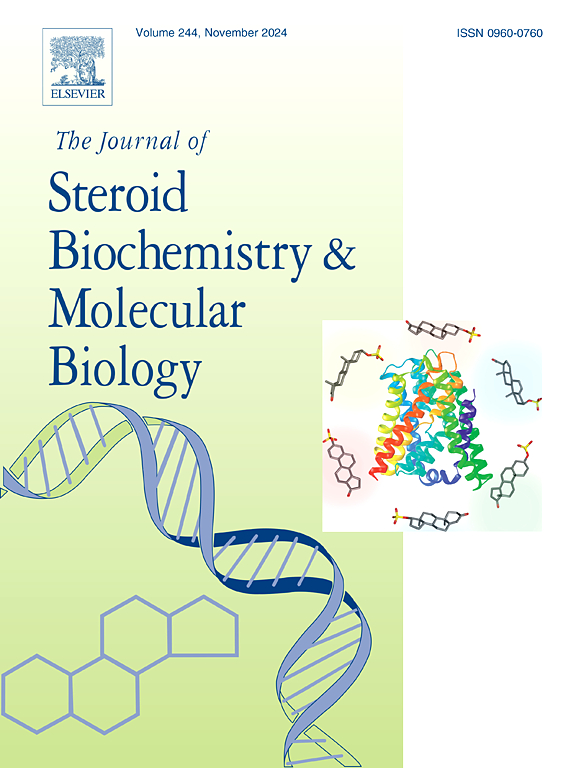NAT10 mediated polycystic ovary syndrome through the ac4C modification of CXCL14
IF 2.7
2区 生物学
Q3 BIOCHEMISTRY & MOLECULAR BIOLOGY
Journal of Steroid Biochemistry and Molecular Biology
Pub Date : 2025-04-27
DOI:10.1016/j.jsbmb.2025.106767
引用次数: 0
Abstract
Polycystic ovary syndrome (PCOS) is a prevalent endocrine disorder among women of reproductive age, underscoring the critical importance of investigating its regulatory mechanisms. N-Acetyltransferase 10 (NAT10) is a crucial enzyme involved in mRNA acetylation modification, mediating target genes expression through N4-acetylcytidine (ac4C) modification to regulate the biological function of various diseases. Nonetheless, the specific role of NAT10 in PCOS regulation remains undisclosed. Ac4C dot hybridization experiment was conducted to determine ac4C expression in PCOS tissues. RT-qPCR was employed to assess the expression levels of NAT10 and CXCL14 in PCOS tissues and KGN cells. Cells viability was assessed using the CCK-8 method, while cell proliferation capacity was evaluated through the colony formation assay and EDU assay. Flow cytometry analysis was utilized to measure the apoptosis rate. The ac4C modification level was determined by acrp-qPCR analysis. RIP and luciferase reporter experiments confirmed the target binding relationship. The rat experiments confirmed the specific regulatory role of NAT10 in polycystic ovary syndrome in vivo. This study highlighted reduced levels of NAT10 and ac4C in PCOS, where silencing NAT10 boosts KGN cell proliferation and suppresses apoptosis. Additionally, NAT10-mediated ac4C modification governed the chemokine CXCL14 expression. Our research unveiled that NAT10 modulated PCOS occurrence and progression by enhancing the CXCL14 mRNA stability through acetylation, presenting potential novel insights into the mechanisms of mRNA acetylation in PCOS.
NAT10通过CXCL14的ac4C修饰介导多囊卵巢综合征
多囊卵巢综合征(PCOS)是育龄妇女中一种常见的内分泌疾病,研究其调节机制至关重要。n -乙酰基转移酶10 (N-Acetyltransferase 10, NAT10)是参与mRNA乙酰化修饰的关键酶,通过N4-acetylcytidine (ac4C)修饰介导靶基因表达,调节多种疾病的生物学功能。尽管如此,NAT10在PCOS调控中的具体作用仍未披露。采用Ac4C点杂交实验检测PCOS组织中Ac4C的表达。RT-qPCR检测NAT10和CXCL14在PCOS组织和KGN细胞中的表达水平。采用CCK-8法测定细胞活力,采用菌落形成法和EDU法测定细胞增殖能力。流式细胞术检测细胞凋亡率。ac4C修饰水平通过acrp-qPCR分析确定。RIP和荧光素酶报告基因实验证实了靶结合关系。大鼠实验证实了NAT10在体内对多囊卵巢综合征的特异性调节作用。该研究强调了PCOS中NAT10和ac4C水平的降低,其中沉默NAT10可促进KGN细胞增殖并抑制凋亡。此外,nat10介导的ac4C修饰控制趋化因子CXCL14的表达。我们的研究揭示了NAT10通过乙酰化增强CXCL14 mRNA的稳定性来调节PCOS的发生和进展,为PCOS中mRNA乙酰化的机制提供了潜在的新见解。
本文章由计算机程序翻译,如有差异,请以英文原文为准。
求助全文
约1分钟内获得全文
求助全文
来源期刊
CiteScore
8.60
自引率
2.40%
发文量
113
审稿时长
46 days
期刊介绍:
The Journal of Steroid Biochemistry and Molecular Biology is devoted to new experimental and theoretical developments in areas related to steroids including vitamin D, lipids and their metabolomics. The Journal publishes a variety of contributions, including original articles, general and focused reviews, and rapid communications (brief articles of particular interest and clear novelty). Selected cutting-edge topics will be addressed in Special Issues managed by Guest Editors. Special Issues will contain both commissioned reviews and original research papers to provide comprehensive coverage of specific topics, and all submissions will undergo rigorous peer-review prior to publication.

 求助内容:
求助内容: 应助结果提醒方式:
应助结果提醒方式:


